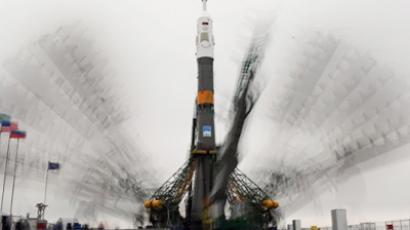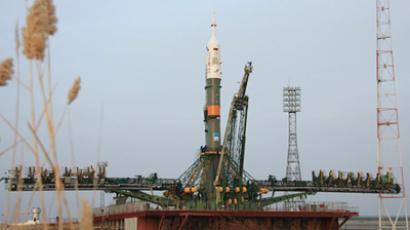Galileo looks to the skies on Russian rocket
A Russian rocket has blasted off for the first time from a Western territory. The Soyuz is carrying satellites for Europe's new GPS system to become a rival to America’s GPS.
The launch, originally scheduled for 10:30 GMT on Thursday, October 20, has been delayed by 24 hours, according to the European Space Agency. A technical problem is said to be the cause of the delay. Upon filling the carrier rocket with oxygen, there was an automatic recall signal for the fill-up, which requires additional time for verification. For the first time a Russian Soyuz carrier rocket has been deployed outside Russia’s launch pads. Its payload is the first two operational satellites for the EU’s Galileo system – Europe's 5.4 billion-euro (US$6.93-billion) rival to the US Global Positioning System.They will join two test satellites already in orbit, allowing the first tests of the Galileo network. Galileo, the largest program ever launched by the European Space Agency (ESA, will eventually consist of up to 27 operational satellites and three spares in three orbital planes. The satellites being launched on Fridayy will for the first time allow operators to test the system, including its ground stations. RT’s Daniel Bushell has traveled to the European Spaceport in Kourou, French Guyana to eyewitness the historic launch.It marks a new high for Russia's space ambitions, as well as providing additional funds for the country to invest in the next generation of space travel.“Soyuz is by far the most reliable launch vehicle in the world, and I must say we are glad to have Soyuz here in French Guyana,” Director General of the European Space Agency Jean-Jacques Dordain explained RT.Soyuz uses a low cost and extremely efficient model of construction, which has successfully launched over 1,700 rockets, far more than any other launcher. European space chiefs say they have been impressed with the way it is built.“All the Russian systems are very simple and effective, it's a very good way of design,” says Project Director Marie Jasinski.A far cry from its sister sites in Russia's north and the steppes of Kazakhstan, this base and the Soyuz have had to be specially adapted to handle the challenges thrown-up by the tropical climate. But the benefits are clear – the Earth rotates faster here by the equator giving an ideal catapult effect on take-off and almost doubling the payload the rocket can lift. Being a superstitious industry packed with quirky traditions, some things remain exactly the same. A piece of rock has even been shipped from the launch pad in Baikonour, which launched Russia's pioneering cosmonaut Yuri Gagarin, who became the first man in space. The rock has been built into the site here.The first mission for Soyuz is to launch the first two satellites of Galileo, a new EU satellite navigation project designed to rival the American GPS system. Politicians also think it can launch a new partnership between Europe and Russia.“Our country actively contributes to industrial, scientific and technical co-operation, for example, in the aerospace field. It is an important step on the way to raising the level of quality of our business ties and diversification of its structures. You know, we have been long trying to use the space launching site at Kourou and have achieved some results in its practical implementation. Over 200 Russian specialists are working there right now,” Russian Prime Minister Putin said, discussing the joint space co-operation with his French counterpart Francois Fillon on the sidelines of the investment forum in Sochi back in 2008.Russia's being trusted with the world's space programs because of its unrivalled track record, dating back over half a century. America's GPS has enjoyed a monopoly on the world sat-nav market till now. With Soyuz also behind Russia's answer to GPS, known as Glonass, competition in the sky is about to get just a little more crowded.














